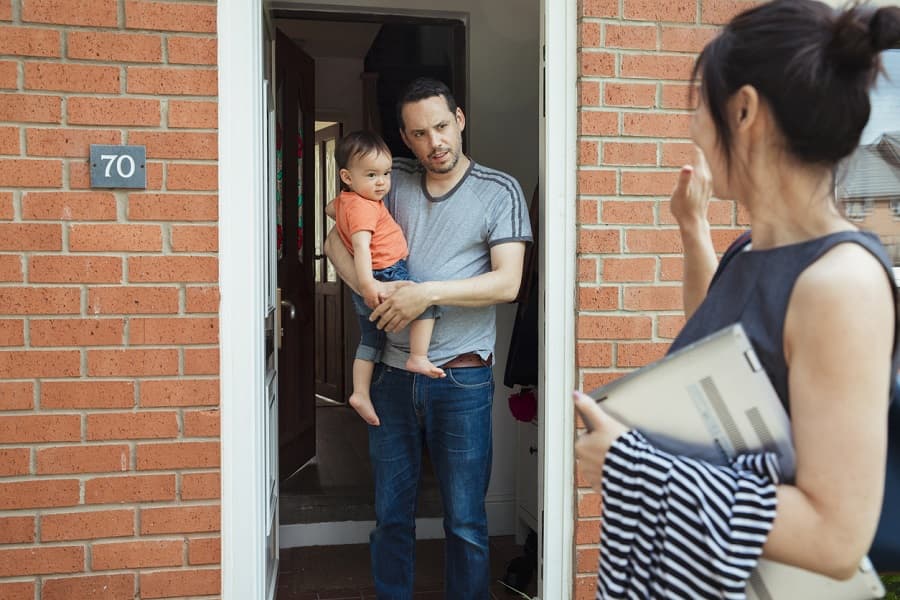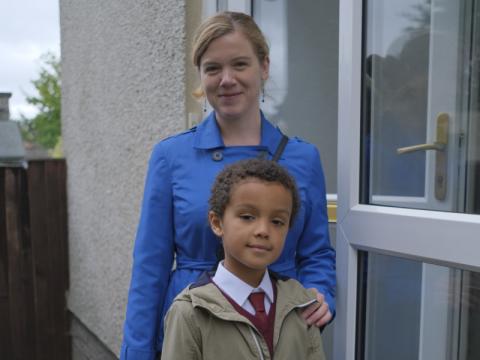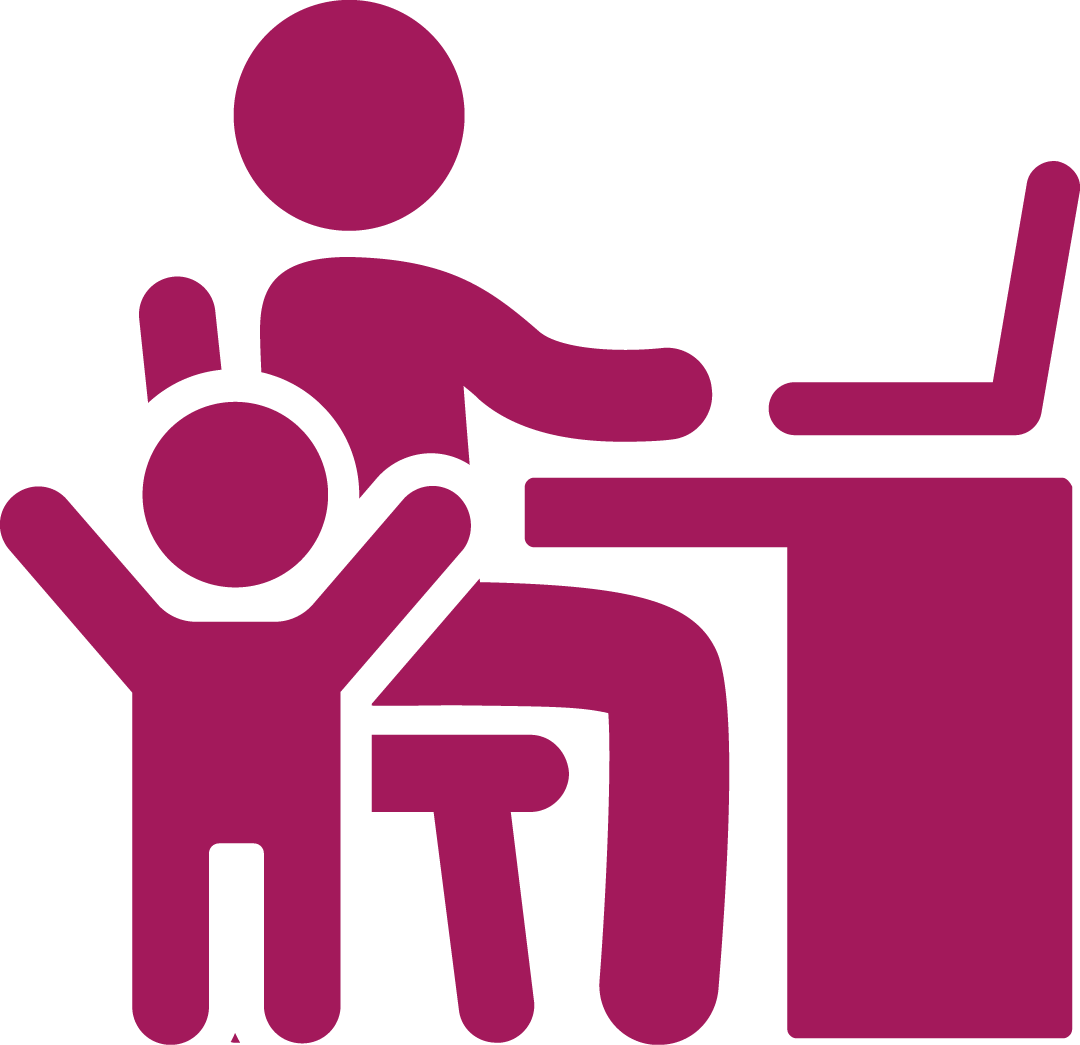Going back to work after maternity leave and having a baby can be hard. In fact just the thought of it may seem overwhelming. It may well be the first time you’ve been separated from your baby for long periods of time and you’re worrying about how you’ll cope. Or you may feel guilty about going back and leaving your wee one behind – or guilty that you’re looking forward to a bit of peace and a chance to actually finish a cup of tea. You may worry that you’ve forgotten how to do your job, or that your skills need updating.
If this is you, you’re not alone – lots of women feel like this. Here you’ll find tips for coping, as well as practical advice on your rights and childcare and how your partner can support you.
When should I go back?
There’s no ‘right’ time to go back – it’s up to you. If you’re employed, you’re entitled to up to 52 weeks of maternity leave. You don’t have to take it all, or you may want to make arrangements to take longer. You can find out more about your pregnancy and maternity rights on the ACAS and Maternity Action websites.
What are my rights when I go back?
You may be worried that things will have changed while you’ve been away and you won’t be coming back to the same job. However, there are laws in place to protect your rights here:
- If you’ve been off for 26 weeks or less, you have the right to return to the same job.
- If you’ve been off for longer than 26 weeks, you still have the right to return to your job on the same terms as before. But if it's not possible because there have been big changes to the organisation, you could be offered a similar job.
You can find out more about these rights on the ACAS website.
You may also worry that your employer will treat you differently now you’re a new mum – for example, that they may pass you over for a promotion. But by law they can’t treat you less fairly because you’ve been on maternity leave or because you’re a new parent – this is discrimination. You can find out more about what to do if you feel you’re being discriminated against on the ACAS website.
Your employer also has a duty to make sure you’re safe at work. Visit the HSE website to find out more about health and safety for new mums.
What if I want to continue to breastfeed?
Before you go back to work, let your employer know that you’re planning to continue to breastfeed. Your employer must make sure you’re provided with the private space and extra breaks you need to express milk, and must ensure you aren’t discriminated against because you’re breastfeeding. Our page on breastfeeding and returning to work has more information.
What if my employer isn’t respecting my rights?
If you feel your employer isn’t treating you fairly, there are steps you can take. The ACAS website has advice on how to raise the issue with your employer, and you can also get free advice on your rights from Maternity Action.
What about childcare?
There are lots of different childcare options open to parents, from childminders, playgroups and nurseries to help from friends and family, so it’s worth having a think about what will best suit your family. If you have a 3 or 4 year old, they’ll be entitled to 1140 hours a year of Early Learning and Childcare. This is free to you, funded by the Scottish Government and local authorities. Some 2 year olds are also eligible for funded ELC, you can find out more about this here.

Many parents feel guilty about sending their children to nursery or other early learning settings while they go back to work, but in fact there are loads of benefits for children. The calming and positive influence that early learning and childcare (ELC) offers can help little minds and bodies grow, while the fun, friendly, safe environment helps them socialise and make friends. You can find out more about the benefits of ELC here.
Our section on Early Learning and Childcare has lots of advice on finding the right childcare for you, including funded provision, help with other childcare costs and how you and your wee one can get ready for starting nursery.
What if I want to change or reduce my hours?
If you want to change your hours or duties when you return from maternity leave, you might be able to make a flexible working request. You can find out how to do this on the Maternity Action website.
What if I decide to leave my job?
If you decide you don’t want to go back to your job during or after you maternity leave, you should follow your work’s usual process for resigning, using their notice period.
If you resign while you’re on maternity leave you may need to do a handover at work. If this is the case, you could use your keeping in touch (KIT) days for this. You can find out more about KIT days on the ACAS website.
You can find out more about resigning from your job and how this may affect your maternity pay on the Maternity Action website.
Tips for going back to work after maternity leave
Tip #1: Talk to your employer
Before you had your baby you might have felt that going back to your usual hours was fine, but now you may be reconsidering that. Pre-baby you maybe feels like a different person from post-baby you! Before you go back, you might want to talk to your employer about working more flexible hours, or working from home – anything that will make life a bit easier. You can find out more about flexible working on the ACAS website.
Tip #2: Try and get into a routine before you start back

Babies feel more secure when they know what to expect, so having a consistent morning and bedtime routine will help them settle. Before you go back, try and get into the kind of routine you’ll have when you start work again. That way it won’t come as too much of a shock – for either of you!
Tip #3: Practice leaving your baby for short periods
This may be hard – for both of you – but it’ll help you both get used to being apart. It’ll also reassure your baby that when you go away, you always come back. Perhaps they could start going to childcare a few days before you go back, so you don’t both have your ‘first day’ together.
Tip #4: Sort your work wardrobe in advance
To avoid any early morning panics, it’s a good idea to decide what you’ll be wearing for work before you go back. If you need some new things, there’s no need to go out and buy a whole new wardrobe – you can always borrow or shop second-hand.
Tip #5: Try and make your first week back a short one
Can you start part way through the week, so you don’t have to do a full week all at once? You’ll be glad of it come Friday!
Tip #6: Be proud of your new skills
It’s natural to worry that things may have moved on at work while you’ve been away. You may even worry that you won’t remember how to do your job. (You will remember.) Try instead to focus on the positives. When you have a baby you develop a whole raft of new skills that are equally as handy at work – like time management, prioritising, problem solving, multi-tasking and keeping your cool in the face of a tantrum!
Tip #7: Have a childcare back up plan
Is there a family member or friend who can step in in an emergency? This will help if anything doesn’t go to plan with your usual arrangements. If it’s someone who lives near you, or near your child’s nursery, even better!
Tip #8: Be kind to yourself
Chances are your emotions will be all over the place as you cope with finding your feet back at work, missing your wee one and still probably running on very little sleep. So try and cut yourself some slack. As you settle into your new routine, things will get easier. But if they don’t, you may find that talking to someone about your situation will make a big difference. Your health visitor, family nurse or GP are all here for you, and a directory of third sector services supporting mental health for women, babies and their families can be found here. Our section on wellbeing for new parents has more advice and information.
Tips for dads and partners
Dads and partners have a huge role to play in supporting mums when they go back to work.
Tip #1: Know your rights about taking time off
Having a baby is exciting and wonderful but it can also be overwhelming and you’ll probably need some time off as your family adjusts to your new circumstances. You could also consider taking time off when your partner goes back to work, to help ease them and your wee one into their new routine.
As well as using annual leave, you may be entitled to paternity leave and pay, allowing you to spend time caring for and getting to know your baby during their first year. You don’t have to take the leave immediately but you need to have used it by the time your baby is 56 weeks old (a year and a month).
You may also be able to get shared parental pay and leave, which is where your partner transfers some of their maternity leave and pay to you. You could use this to take turns having time off, or to have time off together, whichever suits your family best.
If you intend to take paternity leave or shared parental leave, make sure you let your employer know as soon as possible.
You can find out more about paternity leave and pay and shared parental leave and pay on the gov.uk website.
You can find out more about how to take time off with baby on the Fathers’ Network Scotland website.
Tip #2: Take advantage of working from home

If your job gives you the option of working from home this may help, especially if your partner is feeling isolated or lonely. Although you’ll still be working, this gives you the opportunity to do things like take baby for a walk at lunchtime, and cutting out the commute gives you more time in the mornings and evenings. You could also talk to your employer about flexible working – you can find out more about this on the ACAS website.
Tip #3: Be there to talk
When your partner goes back to work, they may feel overwhelmed by different emotions and concerns. Make sure you have time to talk together about how they’re feeling, how you’re feeling and what family life will be like when they’re back at work. Don’t try to guess what your partner feels or needs – ask them! And don’t expect them to guess how you’re feeling either.
Tip #4: Reach out
No matter how things have changed in society, dads can still feel under pressure to be the ‘bread winner’, especially if their partner has reduced their hours or taken a less well-paid job to fit round childcare. If the cost of raising a family is weighing heavily on you, you’re not alone – and you don’t have to handle things alone either.
If you feel things are getting on top of you, having a chat to a friend or another new parent can really help put things into perspective. And remember you can always talk to your health visitor too – they’re there for both parents, not just mum. The Fathers’ Network Scotland Directory lists dad-friendly groups and organisations all around the country which provide support, advice or information.
 Activities & Play
Activities & Play Behaviour
Behaviour Childcare
Childcare Development & Growing Up
Development & Growing Up Family, Friends & Relationships
Family, Friends & Relationships Feeding Your Baby
Feeding Your Baby Food & Eating
Food & Eating Health & Safety
Health & Safety Mental Health & Wellbeing
Mental Health & Wellbeing Money & Work
Money & Work Online Behaviour & Safety
Online Behaviour & Safety Pregnancy & First Days
Pregnancy & First Days School & Education
School & Education Sleep
Sleep








 Childcare
Childcare
 School & Education
School & Education